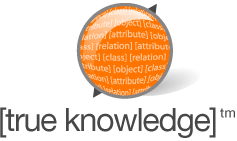The Calais Initiative Looks Back on Its First Month
Published 16 years ago by James Simmons
 The Calais Initiative is almost one month old, and they've already received a large and welcoming response from the development community (1,113 early adopters)! When they weren't busy doing interviews or answering hundreds of emails and forum posts, they were coming up with ways to help spread the technology. They will soon be releasing a Wordpress plugin, followed by plugins for Drupal, Plone and other content management systems. They also express that Calais is not only good for named entity extraction, but can extract other facts from documents. An example they give is "what technologies are associated with what company in a document?" Good luck, Calais team!
The Calais Initiative is almost one month old, and they've already received a large and welcoming response from the development community (1,113 early adopters)! When they weren't busy doing interviews or answering hundreds of emails and forum posts, they were coming up with ways to help spread the technology. They will soon be releasing a Wordpress plugin, followed by plugins for Drupal, Plone and other content management systems. They also express that Calais is not only good for named entity extraction, but can extract other facts from documents. An example they give is "what technologies are associated with what company in a document?" Good luck, Calais team!


Recently Commented Blog Entries